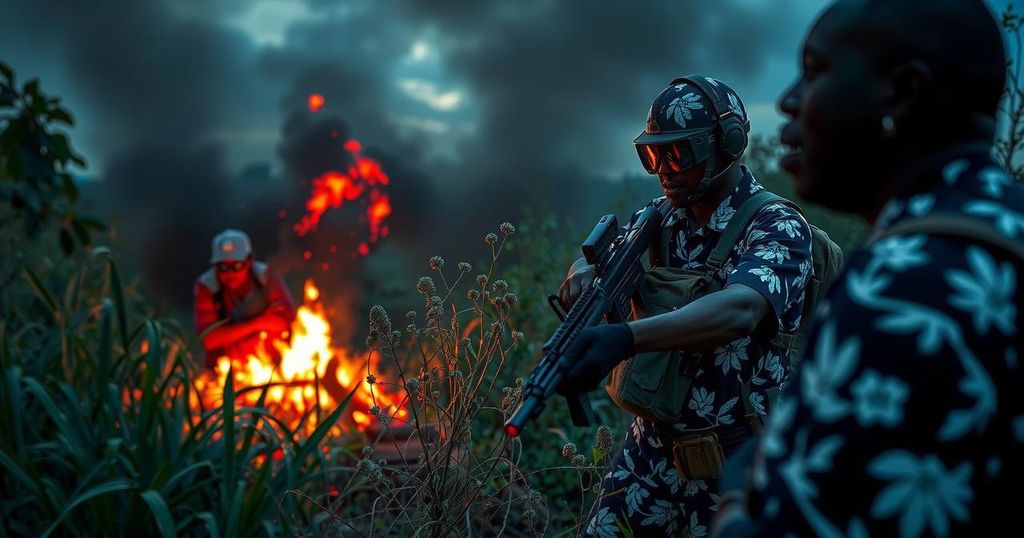Violence Escalates in Mozambique as Gunmen Assassinate Opposition Officials Before Protests
In Mozambique, gunmen murdered two prominent opposition officials from the Podemos party, lawyer Elvino Dias and representative Paulo Guambe, ahead of protests regarding disputed election results. The killings occurred in the capital, Maputo, as tensions mount over serious allegations of electoral fraud against the long-dominant Frelimo party, prompting calls for nationwide strikes. Human rights advocates have characterized the murders as politically motivated, highlighting the ongoing violence against opposition figures.
In Mozambique, two officials from the opposition Podemos party were tragically killed, raising alarm as the nation is on the brink of protests concerning a disputed election result. The victims, Elvino Dias, a lawyer for Podemos, along with party representative Paulo Guambe, were ambushed and fatally shot in their vehicle late Friday night in the capital city, Maputo. This incident coincided with a period of heightened tensions, as the country awaited results of the October 9 election, marred by allegations of electoral fraud and suppression of opposition voices. The activists were pursued by gunmen who fired into their car, resulting in multiple gunshot wounds that claimed their lives instantly. Disturbing footage circulating on social media depicted a BMW SUV riddled with bullets, alongside images of the deceased individuals in the front seats. Podemos has publicly denounced the provisional results proclaiming a victory for the ruling Front for the Liberation of Mozambique (Frelimo) party, which has governed for nearly five decades. Consequently, the opposition called for a nationwide strike on the following Monday in response to the outcome, which they claim is tainted by electoral manipulation. Venancio Mondlane, who has aligned with Podemos yet ran as an independent presidential candidate, has also voiced support against the alleged fraud. Adriano Nuvunga, director of the Center for Democracy and Human Rights (CDD), described the killings as a clear indication of the prevailing climate of injustice within the nation. He characterized the murders as “brutally assassinated [in a] cold-blooded murder.” Human Rights Watch corroborated the attack, highlighting the ongoing issues of political violence and suppression of dissent in Mozambique. Current election reports indicate that Frelimo remains dominant across all provinces, with its candidate, Daniel Chapo, anticipated to succeed current President Filipe Nyusi after his tenure. With the official election results expected by October 24, fears linger regarding potential violence during planned protests on Monday, especially as Mozambique’s security forces have previously used force against demonstrators. Nuvunga’s commentary on social media labeled the killing of Dias a “political assassination,” further emphasizing the danger faced by opposition figures in the country.
The political landscape of Mozambique has been fraught with tension and violence, particularly as the country navigates the aftermath of an election characterized by allegations of electoral fraud, vote rigging, and suppression of dissent. In recent years, the ruling Frelimo party, which has been in power since Mozambique’s independence in 1975, has faced increased scrutiny from opposition parties and civil society organizations, which assert that the democratic processes have been compromised. The recent election, which held significant implications for the future governance of the country, has been overshadowed by political violence, most notably the assassination of key opposition figures. As these events unfold, concerns regarding the security and integrity of opposition voices continue to rise.
The assassination of opposition officials Elvino Dias and Paulo Guambe underscores the perilous state of political affairs in Mozambique, particularly in the lead-up to protests against a contentious election result. These killings exemplify the broader climate of violence and repression that opposition parties face under the prolonged rule of Frelimo. As the country prepares for anticipated protests and seeks to address the allegations of electoral fraud, the need for accountability and justice remains critical to the integrity of Mozambique’s political landscape.
Original Source: www.aljazeera.com




Post Comment